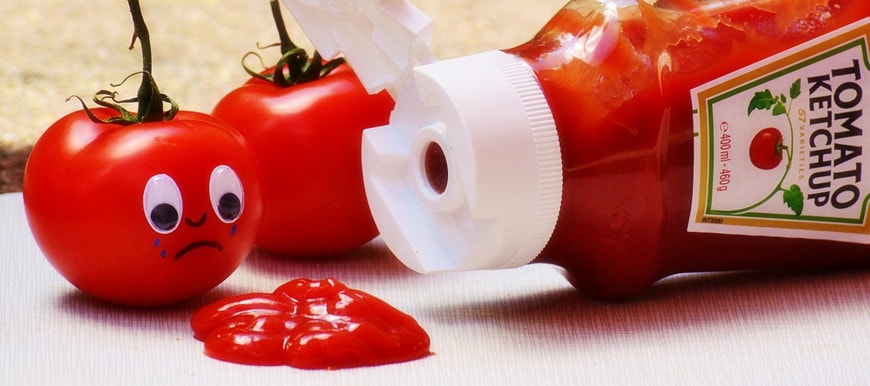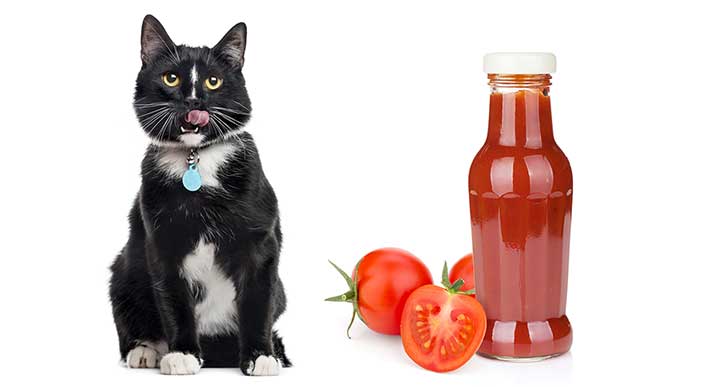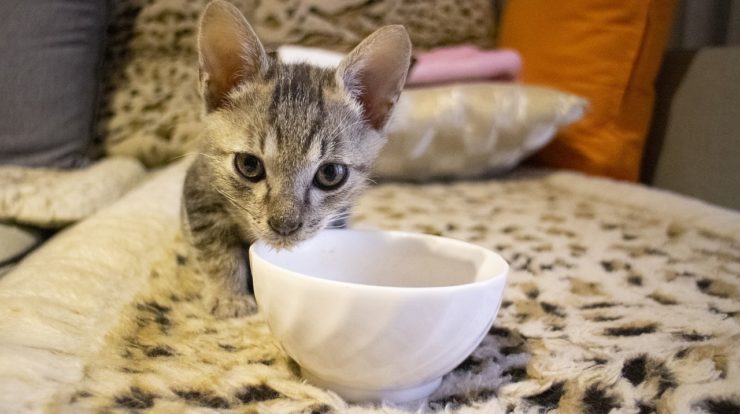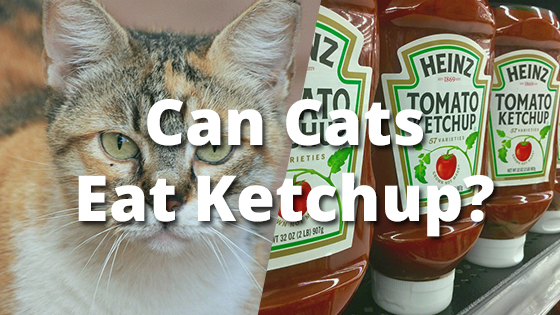Strange question? Absolutely. However, if you are a pet owner, you will certainly know that pets are up to something or the other. So, if you want to know whether or not to freak out about your cat eating ketchup, it is a valid concern and nobody is judging you! If your cat has ingested ketchup (or even if he or she is a fan of it), you might want to know a few things it could do to your pet.
First of all, no. Please don’t let your furry friend eat ketchup!
The likelihood of cats even gravitating towards this condiment is not very high. However, these animals are known to display a wide array of strange behavior, so we really cannot rule this out from happening. But, if your cat does like ketchup, it is not a good thing to let it eat it because ketchup contains garlic and onion as a part of its flavor-make.
The above two ingredients can prove to be extremely toxic to cats, especially if ingested in large quantities (or frequent, smaller quantities) over a period of time. Garlic and onion are powered and added to ketchup and this can cause damage to a cat’s RBC (Red Blood Cells) which might result in the development of a specific type of anemia loosely termed as ‘Heinz Body Anemia.

This sort of anemia can prove to threaten the life of your beloved pet and it can cause a lot of pain and discomfort. Symptoms include fatigue, loss of appetite, fever, discolored urine, paleness (in the skin, gums, lips), and notable shortness of breath. All of this calls for immediate medical attention else your cat’s life might be in grave danger.
During the initial stages, even if the above symptoms are not displayed, you will be able to see some short-term effects like lethargy, weakness, and significant loss of appetite. Ketchup has other ingredients that are harmful as well, but onion and garlic are the most highlighted ones due to the distress they can cause to the animal.
Acidic foods and salt, a bigger no!
Ketchup has salt, it is one of the primary ingredients. This is also something that cats must not be ingesting because this can dehydrate them very quickly. To combat this, your cat might drink loads of water to rehydrate itself (you will be able to notice this), but by doing so, this can make your cat temporarily sick and he or she might end up vomiting. If too much salt is consumed, cats can develop ‘hypernatremia.’
This is a condition commonly known as salt-poisoning. Symptoms include diarrhea, extreme thirst, vomiting, swelling of body parts, low energy, loss of motor coordination (they will stumble a lot), loss of appetite and tremors, and in worst cases, even seizures. If not given medical attention immediately, cats might have permanent kidney damage or this may even, unfortunately, lead to death. Most ketchup that is available for human consumption in the market is highly acidic. If too much of this acid is consumed, the cat might develop gastrointestinal issues as well.

Some more issues with ketchup
Apart from the three most dangerous ingredients mentioned above, we cannot ignore the fact that most ketchup available in stores are highly processed which means, they have a good number of chemicals and preservatives added in them to retain taste and prolong shelf-life. Even for human beings, ingesting these chemicals is not a great idea. But since our bodies have a chance of adapting to this, we survive without obvious issues.
Sugar and corn syrup is added to ketchup frequently and these ingredients are a path towards obesity if cats consume them. Obesity carries a set of health risks along with it. Additionally, other diseases and even Cancer can possibly develop in cats if they keep consuming sugar. If there are any unknown health conditions in your cat, ketchup can make them susceptible or even aggravate an underlying or dormant issue.
My cat has eaten ketchup, now what do I do?
Cats usually stay away from ketchup because this is not really an appealing food. But, if your cat has ended up ingesting ketchup out of sheer curiosity (as cats do), there is no need to panic. Ketchup eaten in small quantities will not cause harm to your cat, but you might need to take action to prevent this from happening again by hiding the ketchup bottle elsewhere, making it unavailable to the cat entirely.

If you feel that your cat might have eaten a large quantity of ketchup, watch out for some key indicators or symptoms that can clear your doubts on whether your cat has ingested dangerous amounts of ketchup or not. Your cat will experience gastrointestinal irritation and issues, it will not eat the way it normally does. Another indicator with cats and dogs is if they have any intestine or stomach-related issues, they tend to chew on green plants (such as grass) to help in digestion and feel better. Either way, if you notice diarrhea, loss of appetite, and dilated pupils, it means your cat needs medical attention immediately.
Is the issue only with ketchup or tomatoes in general?
Generally, eating ripe tomatoes is not an issue. The reaction to the fruit differs from cat to cat. Some cats have a low tolerance for acidic foods and fiber and hence, they may not be able to eat tomatoes. It is important to note that while cats can eat the fruit itself, eating the plant is not recommended. Tomato leaves and stems are highly poisonous to cats and hence, must not be ingested at all.
Additionally, unripe tomatoes can also be problematic for cats. They must not be allowed to eat tomatoes that have not ripened. Avoid letting your cat eat other tomato-based products such as tomato soup, pre-packaged tomato puree or juice, etc because they have all the above-mentioned dangerous ingredients and will show similar effects on cats. It is important to be mindful about what you are feeding your furry friend.
